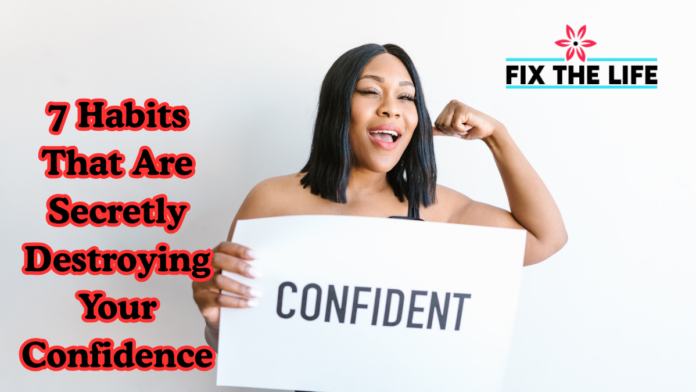Self-confidence is not something you’re born with—it’s something built through consistent thought patterns, behaviors, and self-belief. Yet, many people unknowingly engage in habits that destroy self-confidence, chipping away at their self-esteem over time. These habits can be so subtle they feel normal, but their long-term effects can lead to low self-worth patterns and a distorted self-image.
This article explores seven common yet toxic habits that silently erode your confidence and offers practical strategies to break free.
Habits That Destroy Self-Confidence
1. Constant Self-Criticism
What it looks like:
- Replaying mistakes over and over
- Focusing on flaws instead of strengths
- Using harsh internal language like “I’m so stupid”
Why it’s damaging: Repeated self-criticism can lead to chronic self-doubt. According to psychologist Kristin Neff, self-compassion—not self-judgment—is the foundation of confidence.
What to do instead:
- Practice self-kindness: Speak to yourself like you would to a friend.
- Keep a “wins” journal to reflect on small daily achievements.
2. Seeking Validation from Others
What it looks like:
- Needing approval before making decisions
- Obsessively checking social media likes and comments
- Feeling lost without external praise
Why it’s damaging: External validation is unstable and fleeting. Basing your worth on it makes your confidence dependent on others’ opinions.
What to do instead:
- Set personal goals that matter to you
- Measure progress based on internal growth, not external applause
3. Perfectionism
What it looks like:
- Fear of failure stops you from starting
- You’re never satisfied with your work
- Small mistakes feel like total failures
Why it’s damaging: Perfectionism creates an unrealistic standard, leading to procrastination, anxiety, and burnout. Studies show that perfectionists often experience lower self-esteem and higher stress levels.
What to do instead:
- Adopt a “progress over perfection” mindset
- Celebrate effort, not just outcome
4. Negative Self-Talk
What it looks like:
- “I’ll never be good enough.”
- “I always mess things up.”
- “No one likes me.”
Why it’s damaging: Your thoughts shape your reality. Repeating negative affirmations convinces your brain they are true, reinforcing low self-worth patterns.
What to do instead:
- Challenge negative thoughts with evidence
- Use positive affirmations grounded in truth, e.g., “I am learning and growing every day”
5. Comparing Yourself to Others
What it looks like:
- Scrolling through social media and feeling inferior
- Measuring your success by others’ timelines
- Feeling “behind” in life
Why it’s damaging: Comparison fosters insecurity. The curated online world often portrays exaggerated versions of success, leading to distorted self-perception.
What to do instead:
- Limit social media consumption
- Focus on your unique path and values
6. Avoiding Challenges or Risks
What it looks like:
- Always playing it safe
- Avoiding opportunities that stretch your comfort zone
- Saying no to new experiences out of fear
Why it’s damaging: Confidence grows through experience. Avoidance keeps you stagnant and reinforces the belief that you’re incapable.
What to do instead:
- Embrace discomfort as a growth tool
- Start small: tackle low-risk challenges to build momentum
7. Surrounding Yourself with Negative Influences
What it looks like:
- Spending time with critical or unsupportive people
- Absorbing toxic narratives from TV or social media
- Staying in environments that drain you
Why it’s damaging: We become like the people we spend time with. Toxic environments reinforce toxic habits and beliefs about your worth.
What to do instead:
- Seek uplifting, empowering relationships
- Set boundaries with negative individuals
- Curate your media intake to support positive thinking
Frequently Asked Questions (FAQ)
Q1: How can I tell if a habit is harming my self-confidence?
A: If a habit leaves you feeling anxious, inadequate, or stagnant over time, it’s likely contributing to low self-esteem. Reflect on how you feel before and after engaging in the habit.
Q2: Can I rebuild self-confidence after years of self-doubt?
A: Absolutely. Confidence is like a muscle—it strengthens with consistent, positive action. The brain is plastic and can rewire with new thought patterns and behaviors.
Q3: What’s the first habit I should change?
A: Start with self-talk. It influences all other areas of behavior and mindset. Replace negative phrases with constructive, truthful affirmations.
Q4: How long does it take to see changes in self-confidence?
A: Some people notice a difference within weeks, especially when practicing daily affirmations and stepping outside comfort zones. Consistency is key.
Final Thoughts
The habits that destroy self-confidence are often small, everyday choices we don’t realize are hurting us. But by becoming aware and intentionally shifting these patterns, you can dismantle low self-worth patterns and replace them with empowering practices. Confidence is a skill—accessible to everyone—and with time, effort, and the right mindset, you can build an unshakable foundation of self-belief. Start with one habit today, and you’ll be surprised how far you can go.




